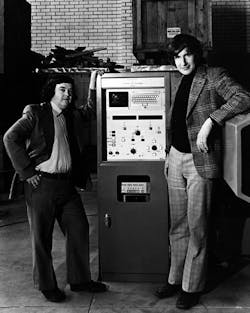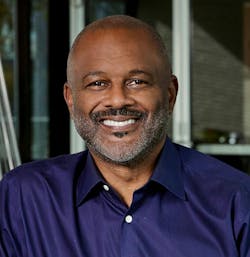So That Happened: Executives Joining and Leaving 3M, GM
Editor’s note: Welcome to So That Happened, our editors’ takes on things going on in the manufacturing world that deserve some extra attention. This will appear regularly in the Member’s Only section of the site.
Goodbye to a Lean Leader
The manufacturing industry—and especially the lean manufacturing community—lost a key member last month. Robert “Doc” Hall passed away after a long, well-lived life devoted to improvement.
He was one of the earliest advocates of lean, so much so that we wrote of him in 2012: “You cannot have a discussion about the early proponents of lean manufacturing in the United States without placing Robert "Doc" Hall high on that list. Indeed, when Hall's book "Zero Inventories" was published in 1983, the term ‘lean’ had yet to be introduced into the manufacturing lexicon. Yet its pages described many of the ideas that evolved into what later became known as lean manufacturing -- just-in-time inventories, kanban and set-up reduction, for example."
That wasn’t the whole of Doc Hall, however. He taught for many years at Indiana University. He was a founding member of the Association for Manufacturing Excellence. His 2009 book, Compression, addressed sustainability at a time when it wasn’t on everyone’s radar.
And he was a friend to IndustryWeek. For many years, Doc served as a judge for the IndustryWeek Best Plants Awards program, and he was there at its inception in 1990. His continuous improvement knowledge as well as his knowledge of so many types of manufacturing were personally invaluable to me when I took over administration of the IW awards program. If I had a question, he was always willing to weigh in. (And I always had lots of questions.) In 2012 Doc Hall was inducted into the IW Manufacturing Hall of Fame.
Thanks, Doc. We’ll miss you.
—Jill Jusko
Should We Worry About an AI's Feelings?
So far, the debate around artificial intelligence has centered around what can it actually do and how many jobs could it potentially displace. But, what about those programs' feelings or legal rights?
That was the central question for wo researchers at Stony Brook University in Stony Brook, New York. A new survey on Americans’ attitudes regarding AI asked participants whether they thought it was possible to construct a computer system that could perform any intellectual task a human is capable of (what the researchers call Artificial General Intelligence or AGI), whether AGI should be built at all and whether AGI should be afforded the same rights as a human being
The first iteration of the survey took place in 2021 and the researchers conducted the survey again in 2023 to see how the data changed in light of the generative AI hype.
Note that we have officially reached a point in human development when asking questions like these does not get one immediately laughed out of the room.
“Individuals who disagreed that AGI was possible were also those most strongly against rights,” Jason Jones, one of the research authors, tells Industryweek.
“Experts (both credentialed and self-appointed) have been opining on AGI for many years now. Much of the discussion has centered around doomsday and dystopian scenarios. We wanted to explore another avenue. What status does the average American think an AGI deserves?” Jones adds.
So far, the best use cases for AI in manufacturing like predictive maintenance, energy efficiency algorithms and vision system-based quality don’t seem to carry risks of sentient AI development.
That said, I wonder about historical concerns regarding automation costing jobs, or operators’ safety concerns when they begin working closely with cobot arms that could do tremendous damage to a human being if things go wrong.
Let’s say the complexity and intelligence of AI deployed on shop floors does rise above the level of current, simple deployments. Will manufacturers someday have to seriously consider operators’ attitudes and fears about AI? Could shift managers, not line operators, fear for their jobs if AI takes a more active role on the floor and manages daily operations faster and more efficiently than a human being?
Even as skeptical as I am about AI, I wonder if we’ve reached a point where these questions also no longer should get someone immediately laughed out of the room.
—Dennis Scimeca
A Changing of the Guard at 3M
A penny for your thoughts, Mike Roman: What does it say about your tenure as CEO of 3M when investors add $2.5 billion in value to the company when your exit is announced?
St. Paul-based 3M said March 12 that Roman will make way (and become executive chairman) May 1 for Bill Brown, the former chairman and CEO of L3Harris Technologies and Harris Corp. before it merged with L3 in 2019. 3M shares (Ticker: MMM) promptly rose 5%, although they are still worth half of their mid-2021 value.
Brown—who is getting a $3 million signing bonus on top of a $1.8 million salary, an annual bonus that could hit $3.1 million and the standard stock incentives—will step aboard 3M after a period in which the storied manufacturer has gone through the wringer, hence the struggling stock. In January of last year, Roman and his team said they would cut 2,500 manufacturing jobs around the world because of so-so demand before following up in April with news of another 6,000 cuts.
Soon after, the company announced it had agreed to pay $10 billion to settle lawsuits alleging “forever chemicals” from the company had polluted some U.S. public water systems. Then, in August, executives reached a $6 billion settlement over claims from military veterans that its earplugs were defective.
“The company has made significant positive changes under Mike’s leadership,” Brown said in 3M’s announcement. “I am looking forward to building on that progress.”
We should note one additional thing given Brown’s history steering the merger of L3 and Harris, which created the country’s sixth-largest defense contractor at the time and was worth $34 billion. Speaking in late January after he reported 3M’s fourth-quarter earnings, Roman said a plan to spin off its healthcare operations remains on track for a mid-year completion and added that several parts of 3M’s portfolio without strong growth prospects will be sold. After that—and maybe after a few more solid up days on the New York Stock Exchange—might 3M shift into buying mode in a big way under Brown?
—Geert De Lombaerde
The Big 5-0
Precision-cutting-tool company ANCA is gearing up to celebrate its 50th anniversary. The Australia-based company will be hosting a series of open houses, seminars and events as well as attending tradeshows across the globe to celebrate the achievement.
Co-founders Pat Boland and Pat McCluskey met in a Melbourne munitions factory in 1968; they would start ANCA six years later in a spare room at Boland’s home.
“Even before we started ANCA, Pat and I have always been driven by simply wanting to get machines to do things better,” says McCluskey when reflecting on the company’s roots. “My enduring philosophy in business is if you always do what you’ve always done, you’ll always get what you’ve always gotten. New ideas and new thinking are the basis of our business.”
Today, about 1.1 billion tools have been created using the company’s grinders. “You would be very unlikely to find any bit of advanced equipment, anywhere in the world, that hasn’t been touched by a cutting tool which has been manufactured on one of our machines,” says Boland.
To advance the company’s dedication to innovation, ANCA notes that new products and developments will be at the center of their half-century celebrations.
—Anna Smith
And the Candy Necklace Goes to…
Forget the Oscars, the Candy Hall of Fame just announced its 2024 inductees. They include Edward Dee (1924-2019), founder of Smarties; and Sylvia Buxton, CEO of Perfetti Van Melle USA, maker of checkout-aisle stalwarts Airheads, Bubblicious and Mentos.
The award was co-founded in 1971 by Arthur Sarnow, a “candy butcher” who peddled sweets in burlesque and vaudeville theaters until the talking pictures killed that business and he went on to pioneer candy vending machines. Early Hall of Fame inductees included big confectionary names like Milton Hershey and lesser-knowns like Daniel “Bubbles” Gillette, who in the 1930s had the candy sales territory of Ohio and Western Pennsylvania locked down.
To qualify, you must have at least 20 years in the candy biz and be at least 50 years old, make significant contributions to the profession and, if alive, be able to attend the Candy Hall of Fame induction ceremony.
Personally, we’d love for the physical awards to be chocolate plaques with sprinkles or a giant Chuckles gumdrop, but apparently, they forgot to ask us. Maybe next year.
—Laura Putre
GM Manufacturing Chief Gerald Johnson Retires
Following a storied, 44-year career that began as a teenager at a General Motors body assembly plant in the Cleveland area, Gerald Johnson is retiring from the automaker as its global executive vice president of manufacturing and sustainability.
“I was 17 and I couldn't even go on the plant floor yet. I had to stay in the office until the following October when I turned 18,” Johnson told Cleveland’s The Plain Dealer in 2014. “Then I was on the floor and I started supervising at 18 years old.”
Johnson rose through the GM ranks for decades, becoming executive director of manufacturing for GM Europe in 2006, North American in 2009, global quality in 2013, operational excellence in 2014, North American manufacturing and labor relations in 2017 and eventually the global manufacturing chief in 2019.
“Gerald’s leadership, vision and relentless pursuit of excellence in manufacturing have left an indelible mark on GM,” GM Chair and CEO Mary Barra said. “His impactful journey from joining the Fisher Body Plant in Euclid, Ohio, to his integral role in GM’s COVID-19 emergency response, is a testament to his unwavering commitment and dedication. We are immensely grateful for his over four decades of service and congratulate him on his well-deserved retirement.”
Johnson’s role at GM was rarely an easy one. Shortly after taking on the global manufacturing role in 2019, he had to deal with a protracted strike by the UAW and shortly after that convert production capacity in Indiana from powertrain components to ventilators as part of the auto industry’s response to the COVID-19 pandemic.
“JP’s unique expertise in global manufacturing innovation, engineering, and operations will accelerate our ability to deliver on our vision for GM with the highest quality vehicles for our customers,” Barra said.
Unlike Johnson, who spent his entire 44-year at one company, GM will be Clausen’s fourth employer in the past nine years.
—Robert Schoenberger
About the Author
Jill Jusko
Bio: Jill Jusko is executive editor for IndustryWeek. She has been writing about manufacturing operations leadership for more than 20 years. Her coverage spotlights companies that are in pursuit of world-class results in quality, productivity, cost and other benchmarks by implementing the latest continuous improvement and lean/Six-Sigma strategies. Jill also coordinates IndustryWeek’s Best Plants Awards Program, which annually salutes the leading manufacturing facilities in North America.
Have a story idea? Send it to [email protected].
Geert De Lombaerde
Senior Editor
A native of Belgium, Geert De Lombaerde has been in business journalism since the mid-1990s and writes about public companies, markets and economic trends for Endeavor Business Media publications, focusing on IndustryWeek, FleetOwner, Oil & Gas Journal, T&D World and Healthcare Innovation. He also curates the twice-monthly Market Moves Strategy newsletter that showcases Endeavor stories on strategy, leadership and investment and contributes to other Market Moves newsletters.
With a degree in journalism from the University of Missouri, he began his reporting career at the Business Courier in Cincinnati in 1997, initially covering retail and the courts before shifting to banking, insurance and investing. He later was managing editor and editor of the Nashville Business Journal before being named editor of the Nashville Post in early 2008. He led a team that helped grow the Post's online traffic more than fivefold before joining Endeavor in September 2021.
Anna Smith
News Editor
News Editor
LinkedIn: https://www.linkedin.com/in/anna-m-smith/
Bio: Anna Smith joined IndustryWeek in 2021. She handles IW’s daily newsletters and breaking news of interest to the manufacturing industry. Anna was previously an editorial assistant at New Equipment Digest, Material Handling & Logistics and other publications.
Robert Schoenberger
Editor-in-Chief
LinkedIn: linkedin.com/in/robert-schoenberger-4326b810
Bio: Robert Schoenberger has been writing about manufacturing technology in one form or another since the late 1990s. He began his career in newspapers in South Texas and has worked for The Clarion-Ledger in Jackson, Mississippi; The Courier-Journal in Louisville, Kentucky; and The Plain Dealer in Cleveland where he spent more than six years as the automotive reporter. In 2014, he launched Today's Motor Vehicles (now EV Manufacturing & Design), a magazine focusing on design and manufacturing topics within the automotive and commercial truck worlds. He joined IndustryWeek in late 2021.
Dennis Scimeca
Dennis Scimeca is a veteran technology journalist with particular experience in vision system technology, machine learning/artificial intelligence, and augmented/mixed/virtual reality (XR), with bylines in consumer, developer, and B2B outlets.
At IndustryWeek, he covers the competitive advantages gained by manufacturers that deploy proven technologies. If you would like to share your story with IndustryWeek, please contact Dennis at [email protected].

Laura Putre
Senior Editor, IndustryWeek
As senior editor, Laura Putre works with IndustryWeek's editorial contributors and reports on leadership and the automotive industry as they relate to manufacturing. She joined IndustryWeek in 2015 as a staff writer covering workforce issues.
Prior to IndustryWeek, Laura reported on the healthcare industry and covered local news. She was the editor of the Chicago Journal and a staff writer for Cleveland Scene. Her national bylines include The Guardian, Slate, Pacific-Standard and The Root.
Laura was a National Press Foundation fellow in 2022.
Got a story idea? Reach out to Laura at [email protected]







